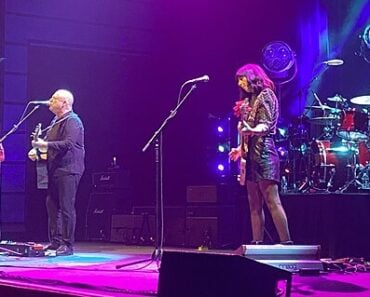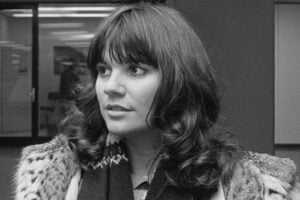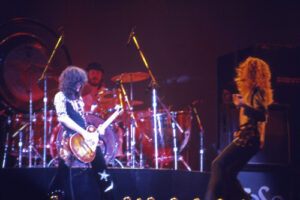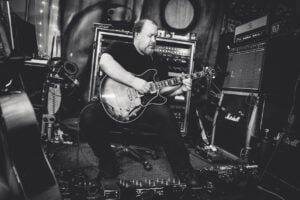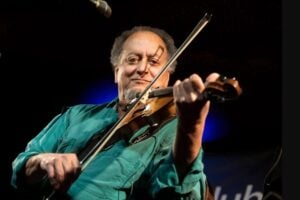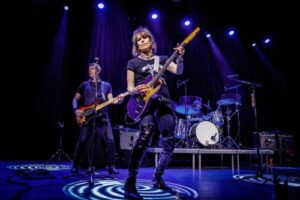
Feature Photo: Ben Houdijk / Shutterstock.com
The Pretenders formed in March 1978 in London when American-born Chrissie Hynde recruited British musicians to realize her musical vision after years of unsuccessful attempts to find her place in the punk scene. The original band consisted of Chrissie Hynde on lead vocals and rhythm guitar, James Honeyman-Scott on lead guitar and keyboards, Pete Farndon on bass guitar, and Martin Chambers on drums. The band took their name from the Platters song “The Great Pretender,” which was a favorite of one of Hynde’s former boyfriends.
Following the tragic drug-related deaths of Honeyman-Scott in 1982 and Farndon in 1983, the band experienced numerous personnel changes, with American-born Hynde serving as the only continuous member throughout their career. The Pretenders achieved significant commercial success with their self-titled debut album in 1980, which became one of the best-selling debut albums of all time and featured hit singles including “Brass in Pocket,” “Kid,” and a cover of the Kinks’ “Stop Your Sobbing.” Their subsequent albums continued to achieve critical and commercial acclaim despite the constant lineup changes.
The band’s discography spans over four decades and includes numerous studio albums, with their most successful being the debut album, Pretenders II in 1981, and Learning to Crawl in 1984. The Pretenders were inducted into the Rock and Roll Hall of Fame in 2005, recognizing their significant contribution to rock music and their influence on subsequent generations of musicians. Despite the tragic losses and constant personnel changes, the band has maintained an active touring schedule and continues to release new material, with Hynde’s songwriting and distinctive vocal style serving as the consistent thread throughout their evolution.
Chrissie Hynde
Christine Ellen Hynde was born on September 7, 1951, in Akron, Ohio, to parents Dolores and Melville Hynde. Her father worked as a manager at Yellow Pages while her mother was a part-time secretary. Growing up in a conservative household, Hynde developed a rebellious streak early and found little interest in conventional education, graduating from Firestone High School despite admitting she never went to dances or dates and found high school generally awful. Her passion lay in music, and she would frequently travel to Cleveland to see bands perform, developing an early fascination with rock music that would shape her future career.
After briefly attending Kent State University’s Art School, where she witnessed the tragic Kent State shooting in 1970, Hynde moved to London in 1973 to pursue her musical ambitions. She initially worked as a music journalist for NME and later at Malcolm McLaren and Vivienne Westwood’s famous punk clothing store, Sex. During this period, she became involved with early versions of influential punk bands including the Damned, the Clash, and the Sex Pistols, though she struggled to find her own equal partnership in any band. She played in several short-lived groups including Masters of the Backside and the Moors Murderers, but these experiences only fueled her determination to create her own musical project.
The formation of the Pretenders began when Dave Hill at Anchor Records heard Hynde’s demo tapes and was impressed enough to help her form a permanent band. Hynde recruited Pete Farndon as the first member in early 1978, followed by James Honeyman-Scott and Martin Chambers, creating the classic original lineup. As the band’s primary songwriter, lead vocalist, and rhythm guitarist, Hynde established herself as one of rock’s most distinctive voices, combining punk attitude with melodic sensibilities and deeply personal lyrics that resonated with audiences worldwide.
Following the deaths of Honeyman-Scott and Farndon, Hynde became the sole constant member of the Pretenders, demonstrating remarkable resilience in maintaining the band’s identity through numerous lineup changes. She has continued to write and perform with various incarnations of the Pretenders while also pursuing solo projects, including her 2014 album Stockholm and collaborations with artists ranging from Frank Sinatra to UB40 to Kendrick Lamar. Hynde has also been an outspoken advocate for animal rights and vegetarianism, opening a vegan restaurant in her hometown of Akron and supporting organizations like PETA throughout her career.
James Honeyman-Scott
James Honeyman-Scott was born on November 4, 1956, in Hereford, England, and became one of the most innovative guitarists of the early new wave movement before his tragic death at age 25. Before joining the Pretenders, Honeyman-Scott played in several local bands including the Cheeks with future Pretender Martin Chambers and former Mott the Hoople keyboardist Verden Allen. He was working in a music store selling guitars and growing vegetables to support himself when Pete Farndon recruited him for the Pretenders in 1978. His musical influences included Cream, the Allman Brothers Band, Nick Lowe, Elvis Costello, and later Dave Edmunds and Billy Bremner from Rockpile.
Honeyman-Scott’s role in the Pretenders extended far beyond lead guitar, as he also contributed keyboards, backing vocals, and served as a crucial collaborator in shaping the band’s distinctive sound. His approach to guitar playing emphasized melody over virtuosity, focusing on creating parts that served the songs rather than showcasing his technical abilities. He co-wrote several songs with the band and was instrumental in developing the melodic elements that distinguished the Pretenders from their punk contemporaries. His innovative guitar work on songs like “Kid,” “Brass in Pocket,” and “Talk of the Town” became templates that influenced numerous guitarists, most notably Johnny Marr of The Smiths, who cited Honeyman-Scott as his primary influence.
The guitarist’s contributions were cut short when he died of heart failure caused by cocaine intolerance on June 16, 1982, just two days after the band had fired Pete Farndon for his substance abuse problems. Honeyman-Scott was found dead at a girlfriend’s apartment in London, leaving behind a wife, Peggy Sue Fender, whom he had married in April 1981. His death devastated his bandmates and profoundly affected the Pretenders’ future direction, with Chrissie Hynde later stating that keeping the band alive was partly a tribute to Honeyman-Scott’s memory and their shared musical vision.
Honeyman-Scott’s influence extended far beyond his brief career with the Pretenders, as his melodic approach to guitar playing became a blueprint for the emerging alternative rock and indie pop movements. His ability to blend punk energy with sophisticated pop sensibilities helped bridge the gap between the raw aggression of punk and the more accessible sound of new wave. The song “Back on the Chain Gang,” which Hynde wrote as a tribute to him, became one of the Pretenders’ biggest hits and serves as a lasting memorial to his musical contributions.
Pete Farndon
Peter Granville Farndon was born on June 12, 1952, in Hereford, England, and became the founding bassist of the Pretenders after being recruited by Chrissie Hynde in early 1978. Before joining the Pretenders, Farndon attended Hereford Cathedral School and played with various local bands including Cold River Lady until 1976, followed by a tour with Australian folk-rock band The Bushwackers in 1978. His musical influences included accomplished bass players like Stanley Clarke and guitarist Jeff Beck, and he brought a solid rhythmic foundation and distinctive visual style to the early Pretenders that complemented Hynde’s punk aesthetic.
Farndon played a crucial role in establishing the Pretenders’ tough image and sound, often appearing onstage in biker clothing or later in samurai gear that reflected his interest in martial arts and alternative culture. Beyond his bass playing, he contributed backing vocals and co-wrote two songs for the band, “The Wait” and “Space Invader.” His partnership with drummer Martin Chambers formed a formidable rhythm section that could handle Hynde’s unconventional timing and song structures, with Chambers later recalling how they would arrive early to rehearsals to work through the musical complexities of Hynde’s compositions.
As the Pretenders gained success with their debut album and Pretenders II, Farndon’s drug use began to create serious problems within the band by early 1982. His behavior became increasingly erratic and belligerent, causing strained relationships with his bandmates and affecting the band’s ability to work effectively. The situation reached a breaking point when James Honeyman-Scott threatened to quit if Farndon wasn’t dismissed, leading to his firing on June 14, 1982. The tragic irony was that Honeyman-Scott died of a drug overdose just two days later, leaving the band devastated by the loss of both members within a matter of days.
After his dismissal from the Pretenders, Farndon attempted to form a new band called Samurai with former Clash drummer Topper Headon and other musicians, but the project was short-lived. On April 14, 1983, at age 30, Farndon was found dead by his wife, having drowned in his bathtub after losing consciousness from a heroin overdose. His death marked the end of the original Pretenders lineup and left Chrissie Hynde and Martin Chambers as the only surviving founding members. He was buried at St. Peter’s Church in Withington, Herefordshire, and is remembered as an integral part of the classic Pretenders sound that defined their most successful period.
Martin Chambers
Martin Dale Chambers was born on September 4, 1951, in Hereford, England, and has served as the Pretenders’ drummer through two separate tenures, making him the only original member besides Chrissie Hynde to survive the band’s early tragedies and continue with the group. Before joining the Pretenders, Chambers played in various local bands including the Cheeks with James Honeyman-Scott and former Mott the Hoople keyboardist Verden Allen. When he joined the yet-unnamed Pretenders in 1978, he was working as a driving instructor in Tufnell Park, London, having secured the job through a course with the British School of Motoring.
Chambers began playing drums professionally in 1967 as a self-taught musician who believed drumming was something he could do instinctively rather than through formal training. His influences included jazz drummers like Elvin Jones, Buddy Rich, and Louis Hayes, as well as rock drummers Charlie Watts and Keith Moon. His musical journey took him through various genres from blues bands to progressive rock before finding his place with the Pretenders. His hard-hitting yet musical style proved perfect for the Pretenders’ sound, with his ability to handle Hynde’s unconventional timing becoming a crucial element of the band’s rhythmic foundation.
The original Pretenders lineup came to a devastating end with the deaths of James Honeyman-Scott in 1982 and Pete Farndon in 1983, leaving Chambers and Hynde as the only surviving members. They continued the band with new musicians, including Robbie McIntosh on guitar and Malcolm Foster on bass, releasing the successful album Learning to Crawl in 1984. However, Chambers was dismissed from the band in 1986 when Hynde declared he was no longer playing well, though Chambers has suggested it was actually because the band was playing too well and Hynde wanted a rougher sound.
After nearly a decade away from the Pretenders, Chambers was invited back by Hynde in 1994 during the sessions for Last of the Independents, and he has remained with the band since then as both an official member and touring drummer. While he doesn’t always appear on studio recordings (notably absent from some recent albums), he continues to tour with the Pretenders and brings his distinctive style to live performances of newer material. Beyond the Pretenders, Chambers has maintained connections with other musicians, including filling in for Mott the Hoople reunion shows in 2009 and 2013, and playing on albums for other artists including Razorlight’s Olympus Sleeping in 2018.
Robbie McIntosh
Robbie McIntosh was born on October 25, 1957, in Sutton, Surrey, England, and became the Pretenders’ first permanent replacement guitarist after James Honeyman-Scott’s death. McIntosh joined the band in late 1982 and served as lead guitarist from 1983 to 1987, contributing to some of the band’s most commercially successful work. His guitar work appeared on Learning to Crawl in 1984, which became the Pretenders’ most commercially successful album, and Get Close in 1986. Interestingly, Honeyman-Scott himself had suggested bringing McIntosh into the group before his death, recognizing his musical abilities.
McIntosh brought a different but complementary style to the Pretenders, helping to maintain their melodic approach while adding his own distinctive touch to their sound. His tenure with the band coincided with major hits including “Back on the Chain Gang,” “Middle of the Road,” and “Don’t Get Me Wrong.” After leaving the Pretenders in 1987, McIntosh went on to have a successful career with other notable acts and has remained an respected figure in British rock music.
Malcolm Foster
Malcolm Foster was born on January 13, 1956, in Gosport, Hampshire, England, and served as the Pretenders’ bassist during two separate periods from 1983-1986 and briefly in 1987. Foster joined the band alongside Robbie McIntosh as part of the new lineup that recorded Learning to Crawl, helping to establish the post-tragedy Pretenders sound. His bass work provided the foundation for some of the band’s biggest hits during their most commercially successful period.
Foster’s relationship with the band was closely tied to his musical partnership with Martin Chambers, and when Chambers was dismissed in 1986, Foster also left the band in protest, stating that Chambers was the rhythm section of the Pretenders regardless of who played bass. He briefly returned in 1987 but his second tenure was short-lived. His contributions to the Pretenders helped bridge the gap between the original lineup and the band’s continued evolution.
Blair Cunningham
Blair Cunningham served as the Pretenders’ drummer from 1986 to 1993, making him one of the longer-serving members during the band’s transitional period. Previously a member of Haircut One Hundred, Cunningham brought his own rhythmic approach to the band during a time when they were experimenting with different sounds and lineups. He appeared on Get Close in 1986 and Packed! in 1990, contributing drums, backing vocals, and occasional percussion.
Cunningham’s tenure coincided with a period when the Pretenders were essentially functioning as Chrissie Hynde’s backing band, with frequent personnel changes and evolving musical directions. His drumming helped maintain the band’s rhythm section during years when they were working to redefine their sound and identity following the losses of the original members.
T.M. Stevens
T.M. Stevens served as bassist for the Pretenders from 1986 to 1987, contributing to the Get Close album. Stevens brought a funk-influenced bass style to the band during their mid-1980s period, adding a different rhythmic dimension to their sound. His tenure was relatively brief but occurred during an important transitional time for the band as they continued to evolve their musical approach.
Stevens was part of the lineup changes that characterized the Pretenders during the late 1980s, when Chrissie Hynde was experimenting with different musicians and sounds. His bass work on Get Close helped support some of the band’s notable singles from that period. Stevens passed away in 2024, marking the loss of another musician who had contributed to the Pretenders’ extensive history.
Johnny Marr
Johnny Marr, the legendary guitarist from The Smiths, had a brief but notable tenure with the Pretenders in 1987. Marr joined the band after Robbie McIntosh’s departure and remained until early 1988, contributing to the single “The Windows of the World.” His involvement with the Pretenders was particularly significant given his stature in the music world and his previous acknowledgment of James Honeyman-Scott as a major influence on his playing.
Marr’s time with the Pretenders was short-lived, as this iteration of the band dissolved relatively quickly. However, his brief association with the group represents an interesting connection between two important British rock acts, and his participation demonstrated the continued respect that established musicians had for Chrissie Hynde’s songwriting and the Pretenders’ legacy.
Adam Seymour
Adam Seymour served as the Pretenders’ lead guitarist from 1993 to 2008, making him one of the longest-serving members in the band’s history. Originally from the Katydids, Seymour joined when Chrissie Hynde was forming a new version of the Pretenders in the early 1990s. His tenure lasted fifteen years and included work on multiple albums from Last of the Independents in 1994 through various releases in the 2000s.
Seymour’s long association with the band provided much-needed stability during a period when the Pretenders were working to establish a consistent lineup. His guitar work, keyboards, and backing vocals became integral to the band’s sound during this era, and his collaboration with Hynde helped define the Pretenders’ approach during the 1990s and 2000s. His departure in 2008 marked the end of another significant chapter in the band’s evolution.
Andy Hobson
Andy Hobson served as the Pretenders’ bassist from 1993 to 2005, originally coming from the Primitives. His twelve-year tenure made him another of the band’s longer-serving members, providing bass and backing vocals during the same period as Adam Seymour’s guitar work. Hobson’s bass playing supported the Pretenders through multiple albums and tours during the 1990s and early 2000s.
Hobson’s departure in 2005 marked another transition point for the band, as they continued to evolve their lineup and sound. His contributions helped maintain the Pretenders’ rhythm section during a relatively stable period in the band’s history, working alongside Martin Chambers when the drummer returned to the group in the mid-1990s.
Nick Wilkinson
Nick Wilkinson was born in 1971 in Suffolk, England, and has served as the Pretenders’ bassist since 2005, making him one of the current long-term members of the band. His tenure has included work on albums from Break Up the Concrete in 2008 onwards, with the exception of Relentless in 2023. Wilkinson has provided both bass and backing vocals, contributing to the band’s continued evolution and live performances.
Wilkinson’s long association with the current incarnation of the Pretenders has provided stability to the band’s rhythm section, working alongside Martin Chambers and the other current members. His bass work has supported the band through their recent albums and extensive touring, helping to maintain their musical foundation as they continue to perform and record new material.
James Walbourne
James Walbourne has served as the Pretenders’ lead guitarist since 2008, contributing lead guitar, keyboards, and backing vocals to all releases from Break Up the Concrete onwards. His guitar work has become an integral part of the current Pretenders sound, providing the melodic lead lines that have been crucial to the band’s identity since the James Honeyman-Scott era.
Walbourne’s tenure represents the current era of the Pretenders, working alongside the long-standing members to maintain the band’s musical legacy while contributing to new material. His versatility on multiple instruments has added depth to the band’s live performances and studio recordings, helping to ensure the continued vitality of the Pretenders’ sound.
Eric Heywood
Eric Heywood has served as the Pretenders’ pedal steel guitarist since 2008, adding a distinctive country and folk influence to the band’s sound through his pedal steel guitar and backing vocals. His contributions have appeared on albums from Break Up the Concrete onwards, bringing a different textural element to the Pretenders’ musical palette.
Heywood’s pedal steel guitar has added a unique dimension to the Pretenders’ sound that distinguishes their recent work from earlier periods. His instrument choice brings country and folk influences that complement Chrissie Hynde’s songwriting, demonstrating the band’s continued willingness to incorporate diverse musical elements into their evolving sound.
Carwyn Ellis
Carwyn Ellis joined the Pretenders as an official member in 2022 after serving in touring capacities from 2012 and 2017-2021. He contributes keyboards, acoustic guitar, and backing vocals, appearing on the Relentless album in 2023. His addition to the band represents the most recent evolution in the Pretenders’ lineup, bringing additional instrumental textures and vocal harmonies to their current sound.
Ellis’s progression from touring musician to full member demonstrates the Pretenders’ approach to integrating new talent gradually, ensuring musical compatibility before making permanent additions to the band. His keyboard and acoustic guitar work adds depth to the band’s arrangements, supporting Chrissie Hynde’s compositions while contributing to the group’s live performance capabilities.
Check out similar articles on ClassicRockHistory.com Just click on any of the links below……
10 Most Rocking Pretenders Songs
10 Most Underrated Pretenders Songs
Complete List Of Pretenders Albums And Discography
11 Essential Pretenders Songs
Pretenders New Single Sounds Like The Eighties
Read More: Artists’ Interviews Directory At ClassicRockHistory.com
Read More: Classic Rock Bands List And Directory



